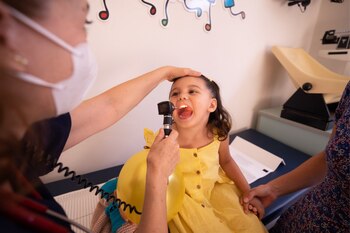
To take steps to prevent the spread of the disease. Authorities throughout the country are vigilant about the emergence of new cases of the coxsackie virus, which affects a population made up of minors, especially those who are between 2 and 5 years old, although this does not determine that it cannot harm adults.
What is known about hand, foot and mouth disease (MPB)? is the name of viral disease, eruptive and human-to-human transmission through contaminated hands and respiratory tract, and is therefore rapidly spreading. It belongs to the family Picornaviridae, of the genus enterovirus, so called because they multiply in the intestine after ingesting food or water unfit for consumption.
Although the symptoms may be confused with those of COVID-19, the pediatric infectiologist at the Guillermo Almenara National Hospital, John Cabrera, ruled out that it is a similar condition, since this is temporary and has no greater impact on those infected.
Another report provided by Raquel Delgado Valdez, pediatrician at INSN San Borja, indicates that although it is a disease that has a benign course and is generally without complications, it is highly contagious and can spread rapidly in children.

WHAT ARE THE SYMPTOMS OF COXSACKIE?
The onset of the disease resembles a flu-like symptomatology with pictures of fever, sneezing, general malaise, decay, headache, throat pain, nausea and irritability. Subsequently, there is a rash of the skin characterized by blisters at the level of the mouth, hands and soles of the feet, in addition to the diaper area.
Its incubation period is between 2 and 10 days, it does not require an antibiotic for its treatment, but it is necessary to control the symptoms, maintain adequate hydration, soft diet, use of the mask and the correct cleaning of the hands, since the infection is through sprays and skin contact.

LATEST NEWS FROM COXSACKIE IN PERU
- According to reports from INSN San Borja, in February there was a case of coxsackie in a 2-year-old girl from the district of Breña.
- In March, two cases were reported in children aged 1 and 2 years, from San Miguel and the Huánuco region.
- So far in April, one case was reported in a minor under 2 years of age in the district of Pachacámac.
HOW TO AVOID CATCHING THE COXSACKIE VIRUS?
Health institutions have issued a series of important resources and recommendations to take care of the population most vulnerable to infection, children, especially with the beginning of the school year and face-to-face classes. These are the measures that must be taken and explained to the minors of the household:
- Hand wash for at least 20 seconds and avoid sharing utensils and food.
- Disinfection of objects that were in contact with the patient.
- Drink plenty of fluids and maintain a healthy diet or soft diet.
- Avoid kissing hello.
- When sneezing, cover with forearm.
REQUEST MEDICAL HELP
Through Diresa it was reported that the telephone lines: 061-787927, 061-787933, 061-788053 and 951 642 156 have been set up for personnel from the Integral Intervention Team to come to the applicant's home from 07:30 to 18:30 hours and verify that it is the coxsackie virus.
The Regional Directorate of Health urges families and schools to increase hygiene measures at home such as hand washing, keeping nails short. In addition to controlling the temperature of the child.
KEEP READING
Últimas Noticias
Debanhi Escobar: they secured the motel where she was found lifeless in a cistern
Members of the Specialized Prosecutor's Office in Nuevo León secured the Nueva Castilla Motel as part of the investigations into the case

The oldest person in the world died at the age of 119
Kane Tanaka lived in Japan. She was born six months earlier than George Orwell, the same year that the Wright brothers first flew, and Marie Curie became the first woman to win a Nobel Prize

Macabre find in CDMX: they left a body bagged and tied in a taxi
The body was left in the back seats of the car. It was covered with black bags and tied with industrial tape
The eagles of America will face Manchester City in a duel of legends. Here are the details
The top Mexican football champion will play a match with Pep Guardiola's squad in the Lone Star Cup

Why is it good to bring dogs out to know the world when they are puppies
A so-called protection against the spread of diseases threatens the integral development of dogs




